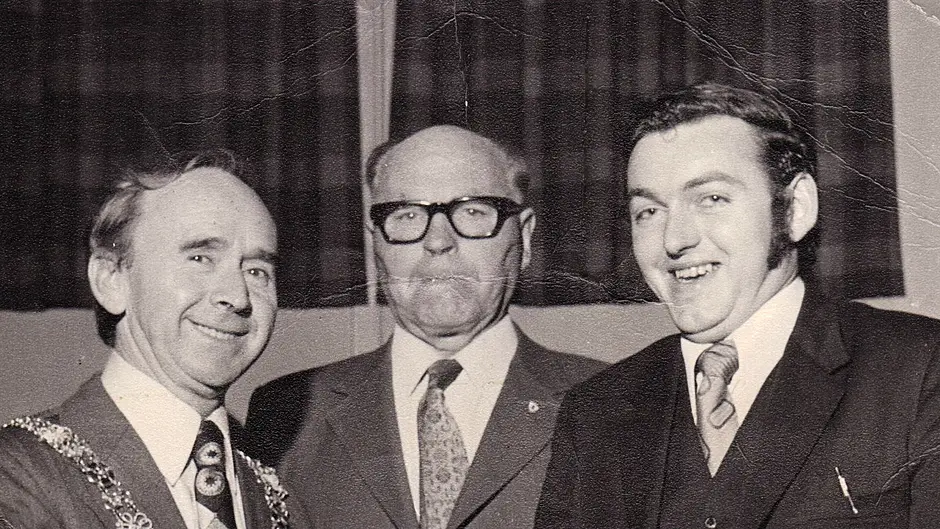This is part 3 in our series on road bowling's junior championship.
**********
BOWLING in the 1970s was played against the backdrop of turbulent times in Northern Ireland while emigration on a large scale also affected its rural heartlands. In his book, Road Bowling in Ireland, Brian Toal acknowledges the difficulties, with particular reference to his native Armagh and the implications of The Troubles on the All-Ireland series.
‘The sporting, cultural and social life in Ireland suffered a protracted reverse during the prolonged period of conflict throughout the 25 years from 1969 to 1994. The period throughout the 1970s had been the most difficult. Road bowling officials, players and supporters were most reluctant to travel north and for a seven-year stretch any championship finals then fulfilled were played in the south,’ Toal wrote.
‘The latter half of the seventies were especially difficult in the logistics of organising and completing the championships in road bowls and, in many ways, the period posed additional problems which required patient perseverance and conciliatory management.’
1975 proved especially difficult in this respect and for a while the entire All-Ireland series was in jeopardy. Just three of the five finals scheduled for that year were played. Brian Toal continues: ‘There were several reasons for the complication. One of the northern contestants was injured in a bomb explosion and was unable to compete. The remaining unfulfilled contests had more to do with a growing resentment of the requirement to travel annually to Cork for the national finals even though it was appreciated as being a temporary arrangement until the serious risks created by the conflict were a great deal less pronounced.
‘There had been an increasing weariness at the prolongation of the arrangement. Misunderstandings on both sides exacerbated the problem. Obviously, southern bowlers had good reason for their extreme reluctance to travel north at that time with safety of players and supporters being of prime consideration. The predicament deepened when press speculation in Munster following the abortive fixtures of 1975 began to question the wisdom of continuing with the All-Ireland series of Road Bowling championships.’
The gravity of the situation was realised and an urgent meeting of representatives north and south was held at Naas in September 1975. The outcome was a hugely positive one and a resolution was found through ‘clarification and total agreement’. The All-Ireland series was preserved, and the un-played finals would be accommodated in the following years programme.
Emigration deprived many regions of some of their best players in the 1970s. However, the additional grades – junior B, C, and novice – were not fully integrated at the time so the junior championship was still contested with large numbers.
For those in exile near the London metropolis a thriving bowling scene existed adjacent to the capital. Launder’s Lane was the go-to spot on a Sunday afternoon. Corkonians working at Ford’s factory near Dagenham had brought bowling to the London borough in the mid-1940s, but it was the formation of the London region by the Jennings brothers, Barney and Willie, in 1969 that took London bowling under the auspices of Ból Chumann na hEireann. The new region produced top-class champions through the 70s, consequence of a fiercely competitive championship that would have included at the time, John Moynihan, The Mons; Mick O’Donovan, Ardfield; George Buckley, Macroom; Pat Kiely, Dunderrow; Pat Murray and Paddy O’Regan, Reenascreena; Tom Hayes, Rosscarbery; Billy Hurley, Dunmanway; Jim ‘Champy’ Deasy, Courtmacsherry; Con Connors and Tim Kelleher, Ballinagree; and Donie Harrington and Jim Sexton, Ring.
Their champions entered the Cork county junior championship at the inter-regional rounds and, after John Moynihan had come close in ’74, losing out in the semi-final to Jack Dan O’Donovan, it was Billy Hurley who was the challenger in ’75, having won London from Jim ‘Champy’ Deasy in a thrilling final at Launder’s Lane.
Hurley, of whom Barney Jennings said in an interview with Jerome Casey, ‘from somewhere always possessed the miracle bowl which accounted for his great winning sequence at Launder’s Lane’, then defeated Mid Cork’s John Murphy and South West’s David Walsh before meeting West Cork’s own champion, Percy Deane, in the county final at Ballinadee.
‘It was’, in the words of Brian Toal, ‘a Dunmanway duel in every sense of the word. The demanding Ballinadee road required plenty of power and each of them had it in abundance. The score attracted many thousands to record perhaps the biggest crowd at any bowling event that year. And the anticipation of a cracking contest was duly confirmed. The lead exchanged several times with some spectacular bowling by both men.’
Hurley won it in the final throw. He would claim the All-Ireland in the grade from Sean Webb in the delayed final at Ballyshonin on August 28th, 1976. Remarkably, Hurley went on to win the 1976 intermediate crown and completed a unique All-Ireland double when he defeated Ulster’s Brendan Digby in that grade final on the same weekend.
The ’76 junior championship was keenly fought, and a new regional winner emerged when Michael Coughlan of Fermoy brought the honour to the North East region for the first time. He faced a formidable West Cork champion, Brendan O’Driscoll, in the county final at Crossbarry and came through narrowly and then followed up with an All-Ireland win, defeating Donal Toal at Ballyshonin.
1977 saw the emergence of a class player from the City in the form of Simon Buckley of White’s Cross. Simon commanded a huge following and impressed in his county final victory over another fine East Cork champion, Barney McCarthy in the decider at New Tipperary. Castleblaney, Co Monaghan hosted the ‘77 All-Ireland series and here Buckley won the national title with a thrilling victory over Armagh’s Paddy McKeown.
The South West division was formed shortly after Brendan O’Donovan’s inaugural win and 20 years later, another from the division claimed the county and All-Ireland junior title. From a family steeped in the bowling tradition, Noel O’Brien engaged in a brilliant campaign to win the 1978 crown. The Miles man, whose brothers Denis and Tim were junior players of high standing also, won the county title by defeating City’s Paddy O’Donovan at Ballyshonin. A dispute over a ‘called’ bowl led to O’Brien being awarded his semi-final score with Bunny O’Driscoll but his final victory was achieved after thrilling duel with O’Donovan in which he came close to the line at the All-Ireland venue in 15 shots. A few weeks later he captured the All-Ireland from Oliver Gribben also at Ballyshonin. Noel would garner further honours through the eighties.
It was back to the City for the 1979 champion as the stylish Fairhill player Joe O’Connor came good against the South West champion John O’Sullivan of Timoleague. Joe went on to claim the All-Ireland at Portmor, Blackwaterstown in a thrilling contest in which he beat a massive last shot of Paul McVeigh by a mere three metres.
To 1980 and a new West Cork champion as Chris O’Donovan from Ballineen went all the way to junior county and All-Ireland glory, the first from the region to capture the national title in the grade. A junior B category had been introduced in the region’s supplementing the now junior A and it was as champion in the lower category that O’Donovan had emerged the previous year to produce a series of top performances that saw him outright champion in junior A, as the new decade dawned.
O’Donovan defeated North Cork’s Pat Corkery, contesting the final for the second time, in a cracking play-off at Ballyshonin. On the same road a week later, O’Donovan got the better of Martin Kinchin, the well-fancied Ulster champion, to complete a magnificent run.










